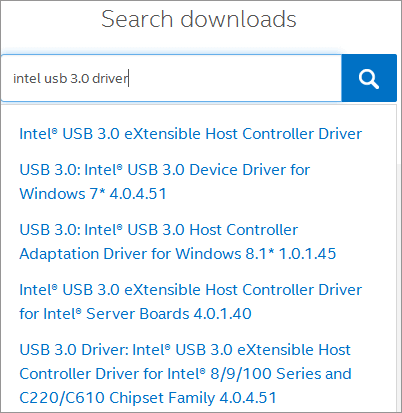The problem I have is getting my HP DV7T-7000 Windows 7 64-bit laptop's USB 3.0 ports to function at USB 3.0 speeds. I used to get 3.0 speeds but noticed I'm having a problem in the last few months. When I attach a USB 3.0 device to a USB 3.0 port I get the message that says your device can perform faster when attached to a super speed port.
I've tried to uninstall the Intel USB 3.0 extensible host controller driver. Re-installation of the latest driver from Intel failed and I got a BSOD during the installation. I updated my BIOS with the latest firmware from HP and the BSOD ceased but the driver still wouldn't install properly. I get an installation error and after restarting the USB 3.0 controller is installed but not USB 3.0 Hub which shows to be an Unknown Device. The driver installation log reveals the details below.
When I tried the Controller driver supplied by HP for my laptop I get a prompt saying that the 'PCI Bus' driver that's installed on my system is newer than the one that's getting installed and whether I want to overwrite it. I don't have System Restore activated on my system and I also don't want to go through the tedious process of re-installing Windows and setup my development environment again. It's worth mentioning that I use Advance System Optimizer to keep my drivers up to date. Any help would be greatly appreciated.
If you upgrade Windows 7 system to Windows 8 or Windows 10, the Intel USB 3.0 eXtensible host controller driver cannot work, you can install the Intel windows 7 USB 3.0 driver with the compatible way to solve it.
IntelUSB3.log:
HennesDriver Downloader
1 Answer
You need to update that PCI bus driver. That's the driver for the USB3<->PCIe bridge controller, and if it says the one already installed is newer, then it's likely a mismatched version to the XHCI and root hub drivers.
Your best bet is to download the newest driver straight from Intel. There are two of them and you probably tried the wrong one. Based on the log file you posted, This is the driver you need
Also, do not allow your 3rd party driver update software to update that bridge driver. The PCI ID is the same as Intel's USB2 bridge chip, but the driver file is different. If that software detects that there's a newer version, it might replace it with the wrong file again. In fact, that may be why it broke in the first place.
Intel Extensible Host Controller Driver Download Windows 7 64
Wes SayeedWes Sayeedprotected by Community♦Jun 20 '16 at 2:53
Thank you for your interest in this question. Because it has attracted low-quality or spam answers that had to be removed, posting an answer now requires 10 reputation on this site (the association bonus does not count).
Would you like to answer one of these unanswered questions instead?
Not the answer you're looking for? Browse other questions tagged windows-7usbdriversbsod or ask your own question.
Why did Intel release two Windows* 7 USB 3.0 eXtensible Host Controller (xHCI) drivers?
Two different Intel® chipset platforms are available for Windows 7. Each platform has its own USB 3.0 xHCI driver:
- Intel® 7 Series/C216 Chipset Family
- Intel® 8 Series/C220 Chipset Family/4th Generation Intel® Core™ Processor with U-Series Platform I/O

Can I install either of the drivers on my computer?
No, the driver must match the chipset family platform for your computer.
Where can I find the download files for the USB 3.0 xHCI Windows* 7 driver?
Are xHCI drivers for Intel USB 3.0 available for Windows* 8?
No, the Windows* 8 operating system comes with an inbox USB 3.0 xHCI driver.